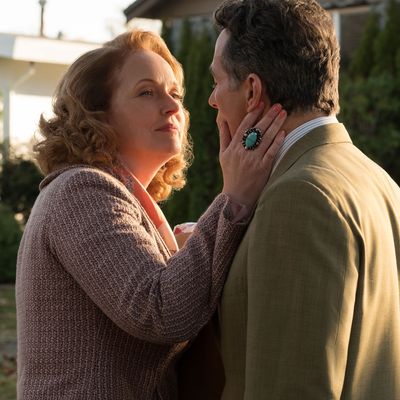
There has historically been something of an imbalance in The Man in the High Castle in terms of how interesting the saga of Rufus Sewell’s John Smith has been compared to the rest of the narrative, but this reaches new levels in “Mauvaise Foi,” a showcase for some of the actor’s best work to date, contrasted against some distracting filler. Sewell is excellent this episode, but the narrative sags every time it drifts from him, and one wonders why the writers wouldn’t just devote an entire hour to what he goes through in this episode. It could have been incredible. Imagine a standalone John Smith hour. More than ever, it feels like it could work.
The most moving episode yet of The Man in the High Castle reaches a point that a lot of science-fiction has in the past when it allows someone to reconnect with a dead loved one. Imagine being able to bring someone you’ve lost back into your life, and then trying to talk them out of putting themselves in danger in a foreign conflict. The episode gains added depth when another ghost from John Smith’s past returns, this one carrying even more burden of responsibility and shame than his son Thomas.
It starts with a great scene set in 1946, after the Allies officially lost the war. The Nazi American Reich is being developed on the East side of the country and men like John Smith are faced with a decision — join or die. There are two important beats in this scene. First, note how supportive Helen Smith when her husband is handed a red armband with a swastika symbol on it. “None of this easy,” she says. “But it’s what’s right.” In the present day, John has repeatedly reminded Helen that she was a part of the family decision to support the Nazis too, and this is proof that she was. Secondly, we meet Danny, a Jew who still wears a Star of David necklace and can’t fall in line like his brother John. They part ways.
Back in the present day, John is told he has 48 hours to play around in the alternate timeline before he has to return to his own. What if he never comes back? As he multiverse-travels, we jump back to the BCR and the Resistance, and the episode already sags a bit. Our most interesting character is literally crossing dimensions, let’s not get distracted.
Part of the problem with the non-John material this season is that it feels like the writers have bitten off more than they can chew. Of course, a show about foreign invaders taking control of the United States should have something to say about the black experience in the middle of the last century, but the final season is too late in the game for the writers to really dig into it, and so the material here feels shallow. When Equiano says that the upcoming negotiations for peace in the Japanese Pacific States is the first time anyone has negotiated with a black man on U.S. soil, that’s an interesting idea — that civil-rights progress would move forward even in this environment, and possibly even more successfully than in our reality when contrasted with a scene later this episode — but there’s no time to really develop it beyond an idea.
Back to John Smith. He’s home in our reality, and we get a succession of wonderful acting beats by Sewell. First, there’s a melancholy one when he kisses Helen, and she flirts with him, as Sewell’s face conveys what’s been lost in his life with the dissolution of his marriage. After John and Helen make love, which one presumes they haven’t in a very long time in the world where she lived with her brother in Montana for a year, Thomas comes home. It’s the son John sacrificed to the Nazi party in his other life. An often cold, calculated man can’t stop himself — he embraces his son. It’s a beautiful beat. A cold man cries, patting his son’s head.
There’s a parallel reunion with someone considered dead when Wyatt Price walks in and hears the voice of Juliana Crain. She’s telling stories about the death of Hitler and trying to stay sane. Each existence is real to Juliana, and she finds some comfort in Wyatt’s arms. Everyone is getting some action this episode.
A negotiation between Equiano and the Japanese kills the good times. First, the BCR wants a black state in the Western region of the United States. Inokuchi, the Japanese liaison, says he will take the offer to the Crown Princess, but that plan ends when shots ring out. Kido and his men ambush the scene, arresting the arguable traitor to the Japanese Military Machine. They are going to court martial Inokuchi in Japanese Pacific States. Peace looks farther away than ever.
The disaster of a meeting could spell the end for Childan, who is now a worthless loose end. It looks like the BCR will cut his throat when the kid asked to do so has a change of heart. He tells him to run. Childan, the cat with nine lives of this show, returns home to Yukiko.
While Helen Smith is being given a “wife companion” to basically make sure her behavior lives up to the Reich’s standards, her husband is still with his other family in our reality. He talks to Thomas about his son’s desire to go fight in Vietnam, saying impassioned things like, “I don’t want to lose you again.” He tells him he’s going to die. And then a thematically rich scene unfolds when two black people go to sit at the counter in the restaurant in which the Smiths are eating. Even though the law says they can, the pair is arrested. And no one says a word. There’s a clear line drawn between John Smith putting on that Nazi armband in one reality and people looking the other way when faced with institutional racism in ours. John can sense it too, yelling at his son about the hollowness of what he wants to fight and die for. “It’s all bullshit.”
A strong episode ends when Danny, from the opening scene in 1946, comes over to watch football in John Smith’s alternate timeline. John literally looks like he’s seen a ghost, and he can’t just hang out with someone he’s betrayed. On the porch he says, “You know I had no choice, right?” Again, Sewell completely lands the emotional beat here, serving as a connection to the flashback that follows in which we see John turn his back on Dan in a truck full of people in an SS parking lot. The truck drives away.
Join the Resistance
The title, “Mauvaise Foi,” refers to the philosophical concept of bad faith, in which people are forced and shaped by society in ways that defy their own beliefs. In other words, perfect for this episode.
John looks at an ad for the high ratings for the premiere of The Munsters in 1964 in the alternate reality. A lot of entertainment from our post-WWII timeline exists in this one, but probably not The Munsters? It feels like the Nazis would see them as genetically impure, right?
I have praised the music choices on this show for years, and one of my favorites so far has to be “Dream Baby” by Roy Orbison as John Smith eats eggs in his alternate kitchen. Not only is Orbison a perfect reflection of the Americana this moment is going for, but, of course, John feels like he’s living a “sweet dream, baby” in that moment.
Speaking of that, alternate John lives in Bailey’s Crossroads, Virginia, and every time they flash the location on the screen, I think of George Bailey, the protagonist of another little story about imagined alternate realities, It’s a Wonderful Life.
How great were the flashback scenes to John Smith in 1946? I would totally watch a spin-off with Sewell about those years, how he rose in the ranks and put his morals away to keep his family alive.


